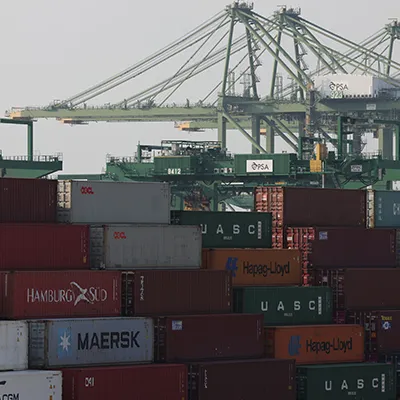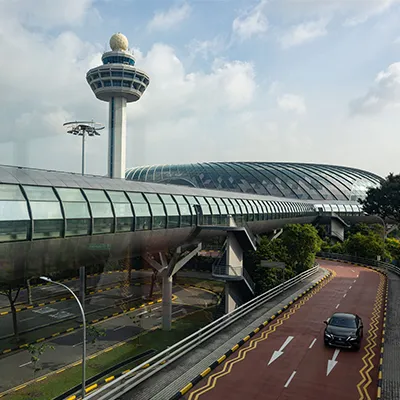MASS Covid-19 vaccines are on the way - and the logistics opportunities they will throw up are not lost on the industry.
Many logistics firms - global supply chains and last-mile operators - are ramping up their cold chain capabilities and positioning themselves for a successful vaccine to hit the market not too long from now.
Leonora Lim, vice-president of life science and healthcare at DHL Customer Solutions and Innovation, Asia Pacific, said: "While we believe that mass distribution of vaccines will take place only after frontline workers are inoculated, we have been working on various freight and distribution solutions across the world to be ready when the time comes."
Similarly, global logistics and freight forwarding company BDP International has set up a dedicated team to manage its global air and sea transport capacity in preparation for the Covid-19 vaccines.
In recent comments, Zuellig Pharma's CEO John Graham also said the group has brought forward "expansion plans to ensure that the vaccine will be accessible to those who need them most, and are able to ramp up capacity quickly when needed."
Earlier this month, Pfizer and Moderna announced that their vaccine candidates showed interim results of more than 90 per cent efficacy in late-stage trials. Oxford University and AstraZeneca are working on a third candidate that has an average efficacy of 70 per cent so far, with one dosing scheme resulting in a 90 per cent efficacy.
Distributing enough doses to vaccinate the world's population would be a monumental task in itself, but this is further complicated by the vaccines' characteristics - they all need to be administered in two doses to be effective, and must be kept in cold storage when transported.
AstraZeneca and Oxford's vaccine can get by with just refrigeration, but Moderna's must be stored at -20 degrees Celsius if it is to be kept for longer than 30 days. Pfizer's requires a shipping and storage temperature of -70 degrees Celsius, or colder than winter temperatures in Antarctica.
In view of this, Zuellig Pharma, a major drug distributor in Asia, has beefed up its cold storage capacity in several countries this year.
In Cambodia, it is building a US$6 million 6,300 square metre (sq m) warehouse that will quadruple the country's cold storage capacity when it is fully operational by the third quarter of 2021.
In the Philippines, it is adding 10 medical-grade freezers to expand its capacity for -80 degree Celsius storage and five new cold chambers. It has also increased its cold chain capacity by 26 per cent this year in South Korea, with cold chain capabilities in its warehouses there covering approximately 10,000 sq m.
The company is working closely with governments, non-government organisations and manufacturers in Asia to understand and plan for the logistical needs of vaccine distribution.
In August, Bloomberg reported that UPS is building giant freezer farms in Kentucky and the Netherlands to store vaccines in temperatures as low as -80 degrees Celsius, while FedEx is expanding its arsenal of freezers and refrigerated trucks, as well as stocking up on sensors.
The sensors are needed for its latest innovation in logistics tracking, the SenseAware ID launched in September. It is a small device that will be placed on packages to transmit precise package location data every two seconds to the FedEx Express network, allowing customers to closely monitor sensitive shipments like Covid-19 vaccines.
Select customers in the healthcare, aerospace and retail industries will be the first to get such enhanced data this month, and more will get access to the service in the first half of 2021.
DHL established an internal task force earlier this year to look at which areas it would need to strengthen for vaccine distribution. In August, it added a US$1.6 million 20,000 square foot facility in Indiana, and opened four healthcare-grade warehouses in Australia in October. It has built a strong foundation in life science and healthcare logistics over the past 20 years, and will continue to expand its capabilities with more ground facilities, equipment, delivery routes and specialists, said DHL's Ms Lim.
"DHL Global Forwarding and the DHL Medical Express team have transported vaccines at deep frozen states in the past and have the means to do so as needed," Ms Lim noted.
Over at BDP International, the company has been collecting insights from partners throughout the logistics chain, including airlines, handlers and temperature-control solution providers to prepare for possible scenarios since August, even though the vaccine transport requirements were still unclear at the time.
Global transport and logistics firm Kuehne+Nagel has already signed first contracts to distribute the vaccines globally, and is confident that its network and storage capabilities can handle the demands of distributing its share of the roughly 15 billion doses it estimates will be needed.
This is based on an assumption that 75 per cent of the world's 7.8 billion population will receive the two-dose vaccines over the next 1 1/2 to two years. The estimate also factors in vaccine wastage at 20 per cent from vaccines discarded, lost, damaged or destroyed.
If half of the needed vials are transported by air, Kuehne+Nagel expects that 700 to 900 fully loaded B747 freighters will be required to handle that volume of freight. Kuehne+Nagel's PharmaChain network includes more than 230 GxP-certified operations worldwide, with more than 45 locations dedicated to the pharmaceutical industry in Asia Pacific.
Singapore will serve as the firm's Asia Hub for distribution in the region, and "should the Covid-19 vaccines have frozen or deep-frozen requirements, we have solutions ready", said Jens Drewes, president of Kuehne+Nagel Asia Pacific.
The firm launched its Singapore Logistics Hub here in 2016, a 50,000 sq m distribution centre specifically designed for the pharmaceutical and healthcare industry. More than 40 per cent of its space is equipped for temperature-controlled storage of 2-8 degrees Celsius, redressing and postponement services. "As one of the world's leading logistics companies, Kuehne+Nagel is ready to deliver the vaccines in Asia. Singapore will play a pivotal role in the vaccine distribution network," Mr Drewes added.
Locally, Singapore-headquartered YCH Group, which has presence in 12 countries across Asia-Pacific, is working with the healthcare authorities to ensure the Republic will have the support it needs to distribute the vaccines when they arrive here.
Jimmy Ng, general manager of cold chain services at YCH Group, expects the group's existing processes and solutions to be able to support a country-wide operation, including cold chain handling where needed. The group is in discussions to further expand its capabilities and footprint in the Asean region, he added. "We are looking to expand our cold chain capabilities overseas, and to augment them with new technologies and innovations, like ultra-low temperature storage for vaccines, coupled with temperature control and monitoring for end-to-end distribution within the country," said Mr Ng.
© 2020 Singapore Press Holdings
This article was written by Leila Lai from The Singapore Business Times and was legally licensed through the Industry Dive publisher network. Please direct all licensing questions to legal@industrydive.com.







